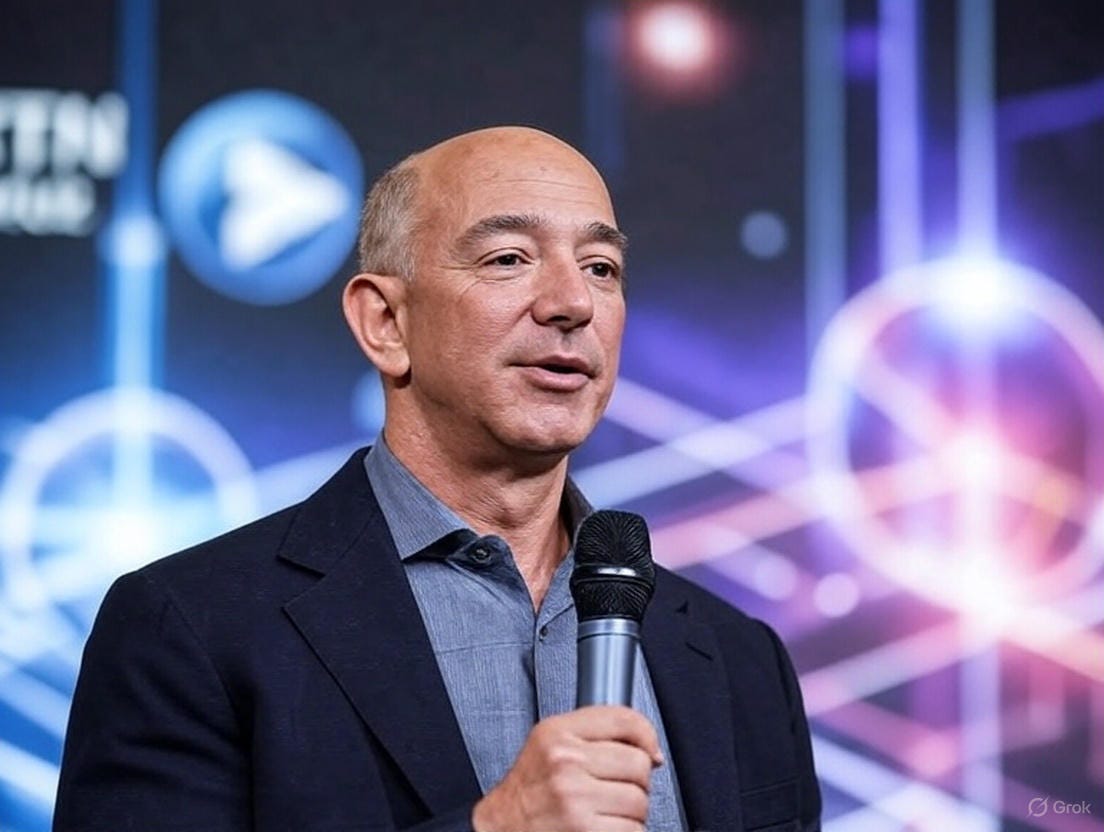The real reason Bezos is dropping billions on AI nobody’s talking about yet
Bezos is back, poaching OpenAI talent and building AI that actually understands physics.
Big news across social right now. Jeff Bezos, who for some reason always gives me the Austin Powers Dr Evil vibe minus the pinky and the bald cat, has dropped his Mediterranean sabbatical and gone all in on a new venture called Project Prometheus.
Prometheus. I sat with that for a moment. Normally, a new venture gets named after something relevant to the company’s activity, usually a mix of words tied to the product or industry. But in this case, Bezos chose a name pulled straight from Greek mythology, after a titan rather than a business theme.
In fact, he was the cheeky Titan (I had to look this up) who defied the gods by stealing fire from Mount Olympus and gifting it to humanity. And for his trouble, he got chained to a rock on eternal barbecue duty, courtesy of Zeus’s HR department.
Strip away the mythic flair, and Project Prometheus emerges as a calculated strike at the heart of an industry stuck in slow motion. A six point two billion dollar war chest, with Bezos fronting a significant slice, fuelling an AI venture that’s already poached nearly one hundred minds from the labs of Meta, OpenAI and Google DeepMind.
Something straight out of Meta’s recent playbook, where they went on a hiring spree to beef up their own AI ambitions.
So he’s back in play, and I didn’t think too much of it at first, apart from the usual “maybe he’s just bored with the Med, retail or rockets.” But the detail that shifted me from that to “okay, this is actually big news” was learning that his new venture is zeroed in on AI for the physical economy. Real tools that simulate and improve the gritty realities of engineering and manufacturing.
Think proprietary models that crunch physics data to virtually test rocket fuselages for thermal stress or check new EV battery chemistries for long term wear. All of it still speculation, but if it works, it could cut prototyping timelines from years to months and trim costs by fifty to seventy percent in the most expensive parts of R&D.
Now, this is all good and well, but where does this actually get applied? What’s the gameplay here?
He is betting big on what I would think is AI that whispers sweet nothings to physics itself, on a mission to drag American manufacturing back from its rusty exile in Shenzhen’s shadow.
Think proprietary models that crunch physics data to virtually test rocket fuselages for thermal stress or check new EV battery chemistries for long term wear. All of it is still speculation, but if it works, it could cut prototyping timelines from years to months and trim costs by fifty to seventy percent in the most expensive parts of R&D.
This is a big play and probably something you would expect from Elon Musk’s playbook, because it’s the meat and potatoes of forward thinking innovation. And I would be remiss if I didn’t admit that part of me wonders if Bezos was stepping out on an overambitious limb.
But then…
You see his operational co pilot, or officially Co-CEO and Co-Founder. It’s Vik Bajaj, a physicist chemist with proper moonshot pedigree. Co founder of Alphabet’s Verily, which is Google’s life sciences arm, and a key architect at Google X, where he helped spearhead both self driving bets and early biotech work.
So Bajaj’s brief is to helm the science while Bezos drives the scale, a setup that mirrors Amazon’s early playbook of relentless execution layered over audacious vision.
Now here’s where the pot gets stirred, because you can’t talk about this without touching the China question. If Prometheus actually works, automation becomes the great equaliser. Labour costs suddenly matter a lot less. Whether a welder in the U.S. charges thirty dollars an hour or someone in Shenzhen charges five… the machine doesn’t care.
Picture AI-run factories pumping out chips and hardware at the same pace as China’s best, boosted by CHIPS Act money and a few well placed Bezos-built plants in Ohio running twenty four seven with robot crews that never call in sick and don’t go on strike. That is the dream scenario.
But poke that bear a little harder. China is not going to sit there and watch. Huawei is already building out its HarmonyOS world, their state backed AI fabs are well into the hundreds of billions, and they control most of the global battery supply. Around sixty percent. The U.S. still trails badly in raw materials. Rare earths? China handles most of that. And you still have the data problem. Prometheus needs huge piles of physics data, and export controls could choke some of the input that these models depend on.
So the only way this works in the long run is if Bezos builds real moats. Maybe he keeps some of the best stuff inside Blue Origin. Maybe he pushes for tight supply chains that Washington will support. Without that, it starts feeling like David squaring up to a dragon that breathes fire.
Could he pull it off? Sure. If he manages to hand out this new “fire” without burning down the village. And if not… well, in true Titan fashion, we might all just end up warming our hands at the blaze.


